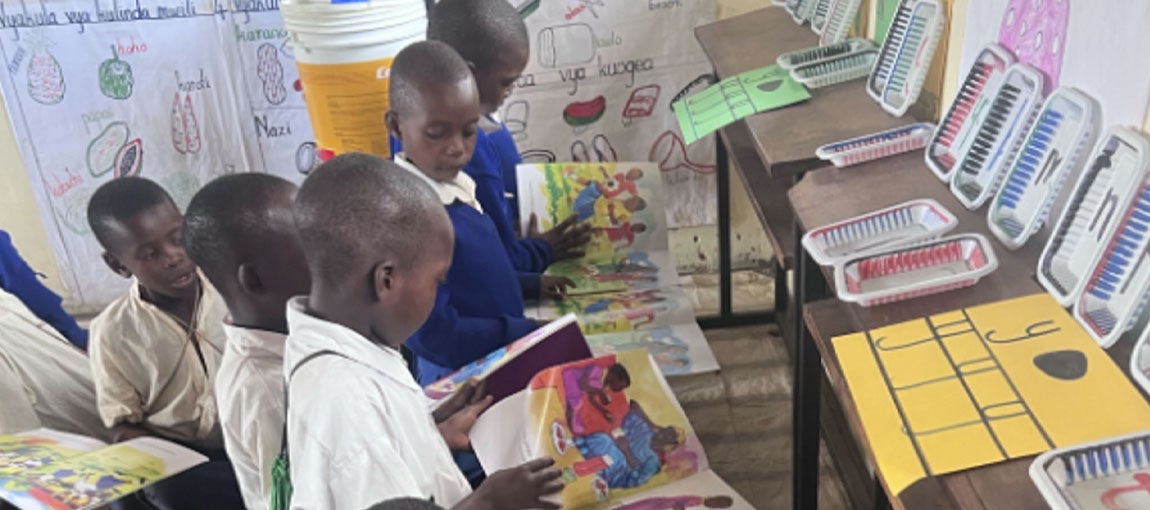 Preprimary students reading story books at Chemba district school. Photo: Magreth Mziray/World Bank
Preprimary students reading story books at Chemba district school. Photo: Magreth Mziray/World Bank
Early childhood education lays the foundation for a child's lifelong learning journey and is vital to fostering their cognitive, social, and emotional development . Investing in Early Childhood Education (ECE) is key to ensuring the youngest learners are equipped with the right tools they need for their developmental growth and future learning success.
The Government of Tanzania has been working towards expanding access to quality ECE. They started in 2014 by making preprimary education formal, fee-free, and compulsory for one year for children aged 5-6 years old. Since then, the government and non-governmental organizations have been actively involved in improving the quality and access to ECE across the country.
Although there have been remarkable achievements, we observe some challenges in getting the balance right for access to quality ECE. There are limited spaces for quality learning, inadequate stock of teaching and learning materials, shortages of qualified teachers, an absence of tools for measuring the quality of ECE service delivery, and low parental and community participation. Solving these challenges is crucial to making quality ECE accessible for all children.
The Quality Early Learning Package (QELP) is one of the largest initiatives in the country to improve access to and quality of ECE. It is supported by the World Bank’s Boosting Student Learning Outcomes (BOOST) Project which incentivizes improvements in equitable access to quality learning in preprimary and primary education in mainland Tanzania. QELP was developed to provide a range of teaching and learning resources that include Swahili and English story books, locally made education materials, classroom video materials like cartoons, and tools for measuring children's learning outcomes. The package also offers manuals and guides for teachers on play-based pedagogies in the classroom, including how to best use these resources for effective learning.
In addition, the QELP provides resources to guide educators to create a supportive learning environment for children. It involves designing a physical environment inside the classroom and outdoor spaces for children to feel safe, with child-appropriate materials that allow play-based learning. The QELP also guides parental and community engagement, and collaboration with different stakeholders. Moreover, QELP outlines ECE teachers' qualifications both for pre-service and in-service and provides quality indicators in the School Quality Assurance (SQA) Framework. The QELP has already been disseminated to 3,000 classes and is expected to be in 12,000 at the end of the project.
Key successes so far
Adequate age-appropriate teaching and learning materials.
Age-appropriate teaching and learning materials help children improve their physical, cognitive, and social-emotional development. The government has distributed teaching and learning materials such as Swahili children's story books (12 titles), video cartoons, tools for measuring children's learning outcomes through play, and supported resources to develop locally made materials that will enhance children's learning.
During a recent school visit, teachers and head schoolteachers explained that the teaching and learning materials they have received are at least enough to support children compared to before the project. One of the preprimary teachers also added that most children are now motivated to come to school every day because there are a lot of materials to play with.

Improved teacher play-based skills
Play-based learning is essential and developmentally appropriate for young children and allows them to be creative, critical thinkers, and gain problem-solving skills. The government has trained teachers to use play-based and child-centered pedagogies to improve literacy and numeracy skills and measure children's learning outcomes through play. To support learning through play, teachers develop locally made materials and design classrooms with visual displays, setting up different learning areas for such topics as mathematics, reading, and writing. Observations made during school visits show teachers have improved in the use of play-based activities in the classroom.

Quality ECE infrastructure
Quality infrastructure is an essential element in offering quality care and learning. The government has constructed preprimary classes and their appropriate infrastructure, including child-friendly and inclusive latrines, desks and tables, and storage spaces. Moreover, the importance of play is acknowledged by creating playgrounds with associated facilities and ensuring that children have safe and enjoyable spaces to play. Children are now happy to learn in the new classrooms and teachers acknowledge that the new classrooms provide the best space for children's learning. One teacher was quoted saying “Now the government preprimary classroom and the environment look like the private schools that children and parents were admiring.”
Increase in enrollment.
Tanzania had experienced a trend of declining preprimary enrollment rates. As of 2021, the Gross Enrollment Ratio (GER) was 76.9%. Moreover, inequities in access were observed. The GER has increased to 84% in 2022 and even further, to 89.46% in 2023 due to mass media campaigns done at both the national and local levels, with targeted messaging and community mobilization through local authorities, encouraging enrollment, especially to the most vulnerable communities.
Beyond doubt, Tanzania is committed and making strides to expand access and improve the quality of early childhood education. We strongly believe that the QELP will go a long way toward establishing a solid foundation for children, ensuring they have the best learning opportunities for future success.



Join the Conversation